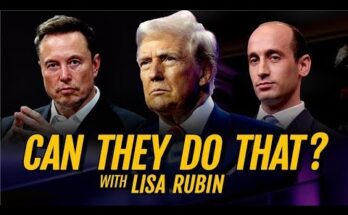Elon Musk’s meteoric rise to the top of the tech world has been nothing short of spectacular. The founder of Tesla, SpaceX, and, more recently, the owner of X (formerly Twitter), Musk is a figure that commands attention and admiration from many for his visionary ideas and boundary-pushing approach to business. But along with this immense power, Musk has also attracted controversy, with critics accusing him of using his wealth and influence as a wrecking ball, dismantling institutions, markets, and even democratic norms in his pursuit of a digital empire.
In a candid conversation with Robert Reich, former U.S. Secretary of Labor, Musk’s growing influence is framed not just as a business success but as a significant societal threat. In their discussion, Reich draws on his expertise in economics, politics, and social justice to critique the implications of Musk’s actions on the public sphere. From the dismantling of traditional media to his seemingly erratic management style and disregard for corporate governance, Musk’s impact is undeniable, but is it positive or destructive? The conversation between Reich and other experts provides an insightful look at how Musk’s “wrecking ball” approach might be dismantling more than just systems of business.
The Rise of Musk and the Power Shift
Musk’s trajectory from a relatively unknown entrepreneur to one of the most influential figures in the world has been marked by his unconventional approach to business and media. Through his ventures in electric vehicles, space exploration, and, more recently, social media, Musk has transformed industries that once seemed impenetrable to outsiders. His acquisition of Twitter in 2022 (rebranded as X) is a prime example of how he has upended existing systems in a matter of months. The decision to purchase X and transform it into an ideological platform reflects Musk’s broader philosophy: disrupt, break down existing structures, and build something new from the debris.
In Reich’s analysis, this approach is both revolutionary and reckless. While Musk’s ideas have made substantial advancements in technology, they come at a steep cost. Reich points out that Musk’s corporate strategies—such as his disdain for labor unions, disregard for worker rights, and antagonism toward government oversight—are emblematic of a broader trend of capitalist excess and corporate control. According to Reich, Musk’s reign is indicative of a system where a select few individuals hold tremendous power over industries that influence everything from job creation to the flow of information. “Musk is the ultimate representation of this system,” Reich says. “He’s not just changing the rules; he’s rewriting the game altogether.”
Musk and the Media Landscape
One of the most glaring impacts Musk has had on society is his treatment of the media, especially through his handling of X. Musk’s management style of Twitter was marked by abrupt changes, controversial content moderation decisions, and a sweeping agenda to foster what he described as “free speech.” While many initially supported Musk’s mission to “restore” free speech, the consequences of his decisions have been far-reaching.
By stripping away content moderation policies, reintroducing banned accounts, and shifting the platform’s content algorithms, Musk has created an environment where misinformation, hate speech, and fringe conspiracy theories can flourish. Reich sees this as dangerous, especially when it comes to the broader implications for democracy. “By consolidating power over one of the largest platforms for public discourse, Musk has given himself an outsized role in shaping public opinion,” Reich explains. “This is not about free speech; it’s about monopolizing information.”
The erosion of trust in traditional media outlets is another concern. Musk’s rhetoric and business moves have contributed to a climate where disinformation and sensationalism are often favored over facts and nuanced reporting. This development is a continuation of a pattern Reich sees in the broader media landscape, where billionaires and corporations increasingly control what people see, read, and hear. With Musk’s influence, many wonder if the very concept of objective journalism is under threat.
Capitalism at Its Extremes: Musk’s Impact on Workers
Musk’s policies as a CEO are also a significant point of concern. Despite being heralded as a visionary, his approach to labor relations has been anything but progressive. At both Tesla and SpaceX, workers have raised concerns about long hours, unsafe working conditions, and an absence of union representation. Musk’s consistent push against unionization efforts within his companies paints a stark picture of corporate America’s shift toward labor exploitation in the 21st century.
Reich emphasizes the need for a shift in how society views corporate responsibility. “We are at a point where CEOs like Musk are willing to tear down the walls of labor rights, environmental protections, and fair wages in their quest for unfettered growth,” Reich says. Musk’s refusal to engage with unions and the practices at Tesla, including reports of harsh working conditions and non-disclosure agreements, are part of a larger trend of diminishing workers’ rights in the face of extreme wealth accumulation.
For Reich, the issue is systemic. It’s not just Musk—it’s the broader capitalist structure that enables figures like him to amass unparalleled wealth while their employees often struggle. Musk’s billions are built upon the backs of workers, many of whom are subject to long hours and grueling tasks. The question Reich poses is: at what cost does this system benefit the public? “We’re witnessing a new gilded age, and Musk is its most prominent figure,” Reich concludes.
Musk, Democracy, and the Future of the Digital Age
Musk’s actions raise broader questions about the role of billionaires in shaping democracy. By controlling companies that influence everything from transportation to social media, Musk has immense sway over the political and economic structures that govern our lives. This centralization of power is a recurring theme in Reich’s critique of modern capitalism.
According to Reich, the concentration of wealth and power in the hands of a few individuals like Musk is a direct threat to democracy. As Musk’s influence continues to grow, so too does his ability to shape political narratives and sway public opinion. By controlling X, Musk is now able to push his own political ideologies, promote his personal business interests, and silence critics—all under the guise of free speech. Reich warns that this represents a dangerous erosion of democratic norms.
Moreover, Musk’s significant influence in politics is underscored by his political donations, his sway over politicians, and his ability to mobilize public sentiment. By using his platforms to promote his own ideologies and attack his critics, Musk is exercising a level of power that no individual should have in a democratic society. For Reich, this unchecked concentration of influence is not only bad for democracy, but it also undermines the basic principles upon which the United States was founded.
Elon’s Wrecking Ball: A Visionary or a Threat?
In conclusion, the conversation between Robert Reich and other experts brings into focus the various implications of Elon Musk’s actions. While Musk’s technological advancements may be seen as impressive, his business practices, treatment of workers, and disregard for the democratic process are deeply troubling. Reich’s critique of Musk centers on the idea that Musk’s vision for the future—one where a single person or corporation controls vast swaths of society—is not one we should aspire to.
As Musk continues to use his power and influence to break down existing systems, the question remains: what kind of society are we building in the process? Is this the future we want—one where a few billionaires dominate not just our economies, but our governments, our media, and our digital lives? According to Reich, the answer is clear: we need to stop Musk’s wrecking ball before it completely demolishes the foundations of democracy, equality, and fairness. If we allow billionaires like Musk to consolidate power unchecked, we may very well lose the very freedoms that have defined the American experiment for centuries.


